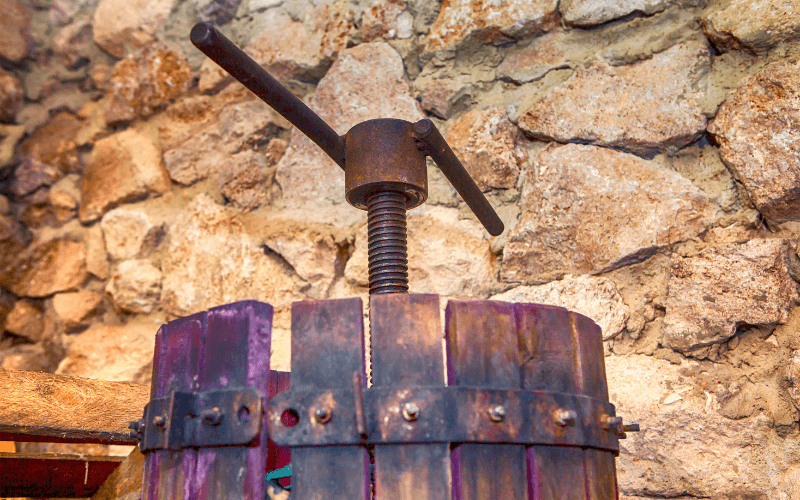Making your own wine really isn’t as hard as you think, and it’s definitely worth a go especially for all you wine lovers. All you need is quality ingredients, a couple trusty tools and a good attitude, and you’ll have your own batch in no time. So, if you’re ready, here are the essential tools you’ll need to make a good glass of wine.
The Basics of Winemaking Equipment
- Primary Fermenter
A primary fermenter is a large container where the initial fermentation process takes place. It needs to be big enough to accommodate your wine (crushed grapes or juice) and have some extra space for fermentation. Primary fermenters are typically made of food-grade plastic or stainless steel. A 6.5-gallon bucket is a popular choice among home winemakers. - Airlock and Bung
An airlock and bung are crucial for controlling the fermentation process. The airlock allows carbon dioxide produced during fermentation to escape, preventing oxygen and contaminants from entering the fermenter. The bung is used to seal the fermenter while holding the airlock in place. - Hydrometer and Test Jar
A hydrometer measures the specific gravity of your wine, which helps you determine the alcohol content and monitor the progress of fermentation. A test jar is used to hold the wine sample for testing. This winemaking equipment ensures you achieve the desired alcohol level and sweetness in your final product. - Siphoning Equipment
Siphoning equipment, including a siphon hose and racking cane, is used to transfer wine from one container to another without disturbing the sediment. This process, known as racking, helps clarify the wine and reduces the risk of off-flavours. - Demijohns
Demijohns are large glass or plastic containers used for secondary fermentation and ageing. They come in various sizes, but a 20L demijohn is commonly used for home winemaking. Glass demijohns are preferred for ageing because they are impermeable to oxygen, which can spoil the wine. - Wine Bottles and Corks
Once your wine has finished fermenting and ageing, you’ll need bottles and corks for storage. Wine bottles come in different shapes and sizes, but standard 750ml bottles are the most commonly used. Ensure you have enough corks to seal your bottles properly. Investing in a good quality corker will make the bottling process much easier. - Sanitising Solutions
Cleanliness is incredibly important in winemaking. Any contamination can ruin your entire batch. Use sanitising solutions to sterilise all your winemaking equipment before use. This step cannot be emphasised enough; always sanitise everything that comes into contact with your wine.
Additional Wine Making Equipment for Enhanced Winemaking
While the basics will get you started, some additional winemaking equipment can help improve the quality and ease of your winemaking process.
- Fruit Press
A fruit press is especially useful if you’re starting from whole fruits rather than juice. It extracts the juice efficiently, leaving behind the skins and seeds. There are different types of presses, including basket presses and bladder presses. Choose one based on the volume of fruit you plan to process. - pH Meter and Acid Test Kit
Maintaining the right acidity level is crucial for good wine. A pH meter and acid test kit allow you to monitor and adjust the acidity of your wine. This winemaking equipment helps you achieve a balanced flavour profile and ensures your wine is stable for long-term storage. - Wine Thief
A wine thief is a simple tool for extracting samples from your fermenter or demijohn without disturbing the entire batch. This is particularly useful for testing and tasting your wine throughout the fermentation and ageing process.
Optional Wine Making Equipment for the Dedicated Winemaker
Those who want to improve their winemaking should consider investing in optional winemaking equipment. These tools are not essential, but if you can afford them, they can enhance the quality of your wine and make the process more efficient.
- Filtering System
A filtering system can help remove any remaining sediment and clarify your wine further. This step is optional but recommended if you want a crystal-clear final product. There are different types of filters available, from simple gravity-fed systems to more advanced electric models. - Wine Racks and Storage Solutions
Wine racks keep your bottles organised and ensure they are stored at the right angle to keep the corks moist. Additionally, consider investing in a wine cellar or wine fridge to maintain optimal temperature and humidity conditions. - Labelling Kit
Labelling your wine adds a personal touch and helps keep track of different batches. A labelling kit typically includes blank labels and a marker or printer. You can get creative with your designs, making your homemade wine look professional and unique.
Final Thoughts on Winemaking Equipment
Starting your winemaking journey is an exciting venture that combines science and creativity. Having the right winemaking equipment is the foundation for producing high-quality wine and enjoying the process from start to finish.
Remember, while it might seem like a lot of equipment, you don’t need to purchase everything at once. Start with the basics and gradually add more tools as you gain experience and confidence. Winemaking is as much about the journey as it is about the destination, so take your time, enjoy the process, and savour the fruits of your labour.
Happy winemaking!
